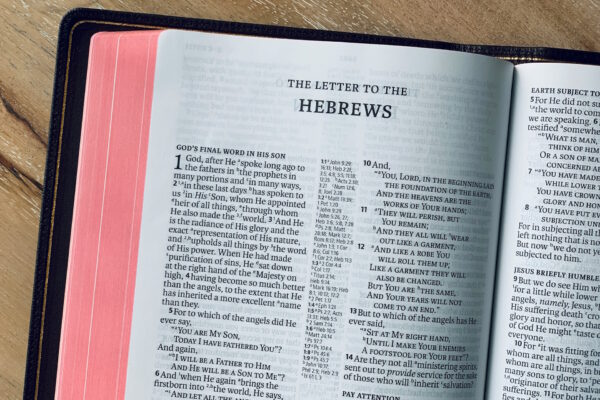Over the last few years, we have made a conscious effort to be more intentional about the songs we sing as a local church. Rather than picking songs simply based on key, tempo, and popularity, with little regard to lyrical content, we’ve aimed to curate a diverse collection of music that provides a biblically-saturated, well-balanced, gospel-centered diet of music for our congregation to carry with them through life. Our focus has not been strictly on musical style, or whether a song is new or old, but what is being sung.
As a leader in our church responsible for planning our Lord’s Day worship services, I often get asked why we sing what we do. Here are eight criteria that help us determine which songs we sing on the Lord’s Day at ECC. Many of these criteria overlap and almost all of them are connected in some degree.
1. Songs that are Singable
The first one is more musical than theological. Simply put: we sing songs that the congregation can and wants to sing. The congregation can easily become a group of spectators when the “singability” of a song isn’t considered. Our goal is for singing to be a participatory, rather than an observational, experience.There are, without a doubt, many great and theologically robust songs written today that are beneficial to Christians. However, they’re not always written with a local congregation in mind, and therefore don’t serve the congregation by helping them sing. As we’ve attempted to incorporate a few modern songs into our worship service—characterized either by difficult ranges or long, repetitious, hype-building bridges—we’ve actually been able see and hear a difference.
I once heard Keith Getty give a great piece advice at a conference. He said the first question you should ask as worship leaders and musicians on Monday morning is not “how did we sound?” but, “how did the congregation sing?” That kind of question shows that care for the congregation and concern for their edification is guiding your song selection.
2. Songs that are Biblical
At ECC, we sing songs, pray prayers, and preach sermons that are rooted in, guided by, and saturated with Scripture. This is based on the conviction we hold that Scripture is God’s very word to us, and that it is sufficient for all of life and godliness. God has revealed to his people not only who he is, but how he is to be worshiped. While this seems like an obvious standard for corporate worship, it is no longer a given in evangelical churches today. We know God through his word; we don’t discover him through “worship experiences.” We want our worship of God to be in harmony with, and in response to, what God has revealed about himself and his work.
This also means we aim to sing songs that use biblical concepts and phrases the way Scripture uses them. For example, while singing about our desire to be “consumed” by the “fire of God” may sound like a good thing to ask for, it doesn’t always give the clearest and most biblically accurate picture of what the fire of God actually is referring to in Scripture (i.e., judgment, wrath, refining the believer through trials; cf. Heb 12:29).
3. Songs that Help Us Declare the Whole Counsel of God
Not only do we want to sing the Bible, we want the word of Christ to dwell in us richly (Col 3:16). At ECC, we look for songs that help us declare the whole counsel of God. We want to serve a healthy well-balanced diet of Scripture for our congregation. This means we pick songs and hymns that focus completely on the multi-faceted character and work of God. In doing so, we leave no room for man-centered songs that rob God of the glory he is due.
Pastors and worship leaders, take inventory of the songs you sing! Are there any songs in your church’s music catalog that praise God for his justice, holiness, wisdom or sovereignty? What about God as Father, Son, and Holy Spirit? Are there songs that focus on the various aspects of our union with Christ? Singing songs that deal only with the love of God is certainly not a bad thing, but only singing about the love of God doesn’t serve your congregation a well-balanced diet of what God has revealed about himself in his word. This is also why we primarily stick with expositional preaching, going verse-by-verse through books of the Bible, as opposed to topical preaching.
4. Songs that are Clear and Comprehensible
We strive to sing songs that are not only biblical but clear in the messages they convey. We avoid songs that are confusing, questionable, unclear, and vague. The church has a wealth of music, old and new, that gives us absolutely no reason to sing anything with questionable lyrics that could potentially confuse our congregation. Once again, if serving the congregation is our goal, why would we want to potentially cause any believer to stumble over questionable lyrics? We want to sing songs, and speak in ways, that give clear expression to our faith (Col 4:4). We should never compromise doctrinal clarity for the sake of singing a trendy song that is vague and unclear.
5. Songs that are Explicitly Christian
At ECC, we want to make it abundantly clear who we are singing to. We want to praise the God who has revealed himself as our Savior by sending His Son and Spirit. In other words, we aim to sing explicitly Trinitarian and gospel-centered songs. This means music that Mormons, Jehovah’s Witnesses, Muslims, and Jews would not be able to sing. Our songs should help us rehearse the good news of what our Triune God has done to forgive, adopt, seal, and glorify us. This doesn’t mean, of course, that every song must explicitly mention Father, Son, and Holy Spirit and the indivisible redemptive works appropriated to each of the three persons subsisting within the one divine nature. But we also should not be content giving praise to a generic “god” that Mormons and Muslims could sing to as well.
Like most churches throughout the ages, our worship tells the story of the gospel. We gather to celebrate and declare the supremacy of the Lord Jesus Christ. We usually begin by praising the greatness of our God, followed by songs, Scriptures, and prayers that remind us of our need for salvation, the work of Christ, and the work of the Spirit as we live the Christian life. Singing explicitly Christian songs evoke true praise and thanksgiving and spur us on to love and obedience.
6. Songs that are Mindful of the “already/not-yet”
While God’s promises are being fulfilled in and through the Lord Jesus, they are not yet complete. The Kingdom of God has been inaugurated in the life, death, resurrection, and ascension of Jesus and the outpouring of the Holy Spirit, but it has not been fully consummated. We are still subject to weakness, sickness, suffering, temptation, death and decay. We are exiles and pilgrims in this world (Heb 13:14; 1 Peter 1:3). The church still looks forward to and longs for the day when Christ returns. Only then will sin and death be no more (cf. Col 3:4; 1 John 3:2).
Therefore, we sing not only of what God has done, but what he will do when he returns in glory. We want to make sure that we maintain a proper balance between the “already” and “not yet” of our salvation. This is why, for example, we sing the hymn, “Come Thou Fount“. In verses 1-2 we praise God for fixing us on the mount of his redeeming love in Christ (the “already”). Then in verses 3-4 we see the “not yet” of our salvation come into focus. In these last two verses we acknowledge our tendency to wander, we pray for God’s preserving grace to keep us, and we long for the day Christ brings us home and we are finally freed from sinning.
7. Songs that Connect us with the Universal and Historic Church
Our culture today celebrates individualism and personal expression while being skeptical about tradition. Unfortunately, this mindset has crept into the church and caused us to look upon the songs and traditions of previous generations of saints with contempt. In doing so, our generation has effectively disconnected the modern church from its historic and biblical past. Singing contemporary worship songs exclusively can actually work against uniting generations of believers; it can make Christ appear to have been crucified and raised from the dead in the 21st century.
So, while we joyfully sing Christ-exalting music written in the last fifty years, we also want to sing what our Christian brothers and sisters have sung throughout the ages, what has withstood the test of time. Just like observing the ancient ordinances of baptism and the Lord’s Supper, we also want to use music to help connect our church with believers all around the world and throughout history. In fact, singing “old songs” can actually serve our congregations by reminding us that our worship doesn’t copy the music of the world or exist to please the world. Old songs can be counter-cultural, reminding the world that we’re not just expressing our own views and priorities.
8. Songs that Prepare Us for Death
We not only want a balanced diet of theology to sing, but we want songs for all seasons of life. As Christians living in the “already/not-yet,” we need songs for the mountains and the valleys. One reason we sing songs and hymns that have withstood the test of time is that they have been carried with believers throughout their lives and helped them face death. We don’t want songs that are purely hype and energy, pretending every day of the Christian life is a Friday. We want music that help us reckon with sin and suffering and gives voice to our hope after death. Our goal is to equip our congregation—young and old, rich and poor, sick and healthy—with the words to sing in the midst of blessing and trials.
****
For further reading:
Worship by the Book, D. A. Carson
Rhythms of Grace, Mike Cosper
Worship Matters, Bob Kaufflin
Desiring the Kingdom, James K. A. Smith
You are What You Love, James K. A. Smith
Christ-Centered Worship, Bryan Chappell
A Better Way, Michael Horton




